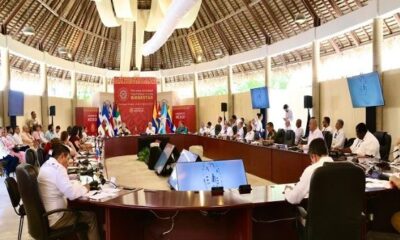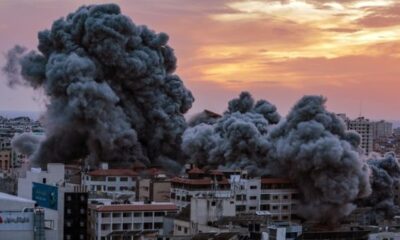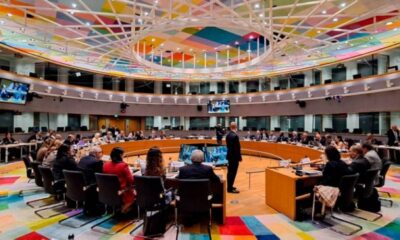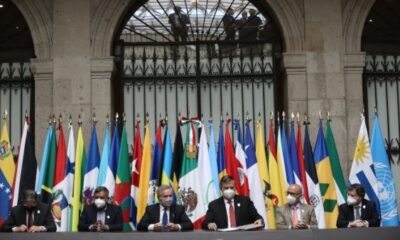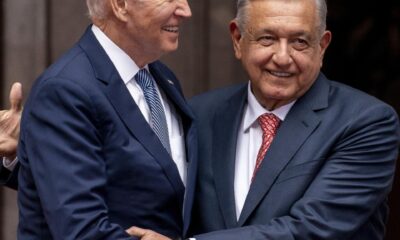International
Latin American leaders hold summit with Brazil back in the fold
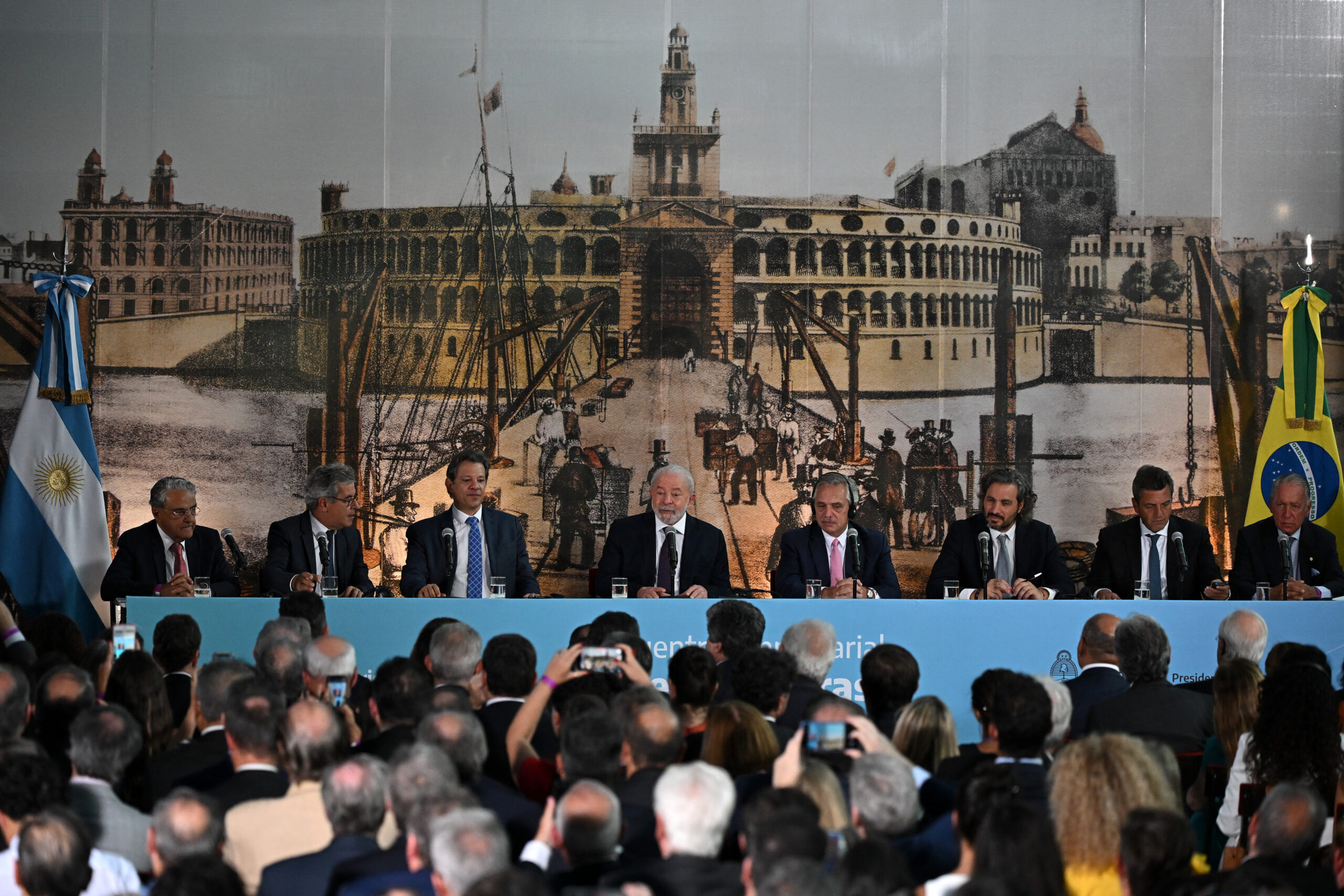
January 24 | By AFP | Philippe Bernes-Lasserre / Mauricio Rabuffetti |
Fifteen Latin American heads of state and government meet Tuesday in Buenos Aires for a regional summit welcoming back Brazil as President Luiz Inacio Lula da Silva looks to rebuild bridges after his far-right predecessor Jair Bolsonaro pulled out of the grouping.
The 77-year-old Lula, in Argentina for the first international trip of his third term, will participate in the seventh Community of Latin American and Caribbean States (CELAC) summit, bringing together 33 states from the region.
Lula was one of the founders of CELAC, during the first “pink wave” on the continent in the first decade of the century.
And now he brings Brazil back into the fold after Bolsonaro had suspended the country’s participation in the grouping.
Host Argentina this week hailed a “new climate in Latin America”, with the region ushering in a new wave of left or center-left governments since 2018, including Mexico, Argentina, Honduras, Chile, Colombia and Brazil.
A forum for consultation and cooperation, CELAC is not a regional integration mechanism with binding opinions.
And for all the importance underlined on Monday by Argentine President Alberto Fernandez and Lula of “the need to integrate Latin America,” CELAC is struggling to unite members over successive regional crises, like Peru.
“Latin America is bankrupt from the institutional point of view (…) it has not succeeded in integrating collectively into the world,” Ignacio Bartesaghi, an expert in international relations at the Catholic University of Uruguay, told AFP.
At the very least, CELAC “remains a vast and diverse space of Latin American countries from which minimal agendas or common interests for the region can be established”, agreed Bernabe Malacalza, researcher in international relations at the Argentine national research center CONICET.
“There is not even certain basic consensus in Latin America, as on the difference between a democracy and a dictatorship,” Bartesaghi stressed.
“There are (at CELAC) presidents who do not even recognize each other,” he noted.
Like Paraguay’s Mario Abdo Benitez, whose country broke diplomatic relations with Nicolas Maduro’s Venezuela in 2019.
Lula meanwhile has pledged to reopen the embassies.
‘Rebuild Mercosur!’
Maduro at last minute called off his trip, citing “a risk of aggression” from “the neo-fascist right,” a possible reference to some Argentine opposition politicians calling for him to be arrested on arrival.
Other significant absentees in Buenos Aires include Mexico’s leftwing President Andres Manuel Lopez Obrador, leader of the second largest economy in Latin America and host in 2021 of the last CELAC summit.
CELAC however remains the interlocutor of choice for China, or the EU to negotiate cooperation agendas with the region.
But even here, “The impossibility of holding an EU-CELAC summit since the last one in 2015 (in Brussels) illustrates (…), the absence of a solid biregional political dialogue,” Malacalza said.
In this sense, the return of Lula could give a boost to certain sub-regional issues, such as the free-trade agreement between the EU and the Mercosur group which comprises Brazil, Argentina, Uruguay and Paraguay.
The deal was finalized in 2019 but never ratified, due in particular to concerns about Bolsonaro’s environmental policy.
Lula has indicated a willingness to resume contacts.
“We are going to rebuild Mercosur!” Lula said Monday evening, referring to the customs union which has been torn in recent months over a free trade treaty with China.
“We will recreate Unasur!” he continued, referring to the moribund Union of South American Nations created in 2008 on the initiative of himself and Venezuela’s Hugo Chavez.
Latin America is only the initial phase of the Brazilian president’s international push, with Lula heading to Washington in February and to China “after March.”
International
Claudia Sheinbaum: Operation Against ‘El Mencho’ Was Based on Pending Arrest Warrants

Mexico’s President Claudia Sheinbaum on Wednesday rejected claims that the military operation that resulted in the death of Nemesio Oseguera Cervantes, known as “El Mencho,” leader of the Jalisco New Generation Cartel (CJNG), was carried out under pressure from the United States government.
Sheinbaum explained that the deployment of federal forces was aimed at executing outstanding arrest warrants against Oseguera Cervantes, who was considered one of the most wanted criminals in both Mexico and the United States.
“That was not the objective (to ease pressure from the United States). It is very important, and I want to repeat it. This individual had an arrest warrant, or several,” Sheinbaum said, referring to the operation conducted on February 22.
According to the president, the initial goal was to capture Oseguera Cervantes, but military forces responded after coming under attack during the intervention.
“The operation was to detain him. The problem is that they were attacked — the Secretariat of National Defense — and they responded at that moment,” she said.
The president insisted that the action was not carried out in response to external demands, although she acknowledged intelligence cooperation with the United States.
“It was not done in any way because of pressure from the United States, not at all. Of course, there was intelligence information from the United States that was used specifically,” she concluded.
International
Spain Denies Any Agreement to Cooperate with U.S. Military in Iran Operations
International
White House Says Spain Agrees to Cooperate with U.S. Military After Trump Threatens Trade Embargo

White House Press Secretary Karoline Leavitt said Wednesday that Spain has agreed “in recent hours” to cooperate with the U.S. military, following President Donald Trump’s threat to impose a trade embargo on Madrid.
Trump had warned of potential commercial measures after Spain reportedly refused to allow the Pentagon to use facilities at Spanish military bases for operations related to Iran.
“With respect to Spain, I think you heard the president’s message yesterday loud and clear, and I understand that in recent hours they have agreed to cooperate with the United States military,” Leavitt said during a press briefing.
She added that the U.S. military is currently coordinating with its counterparts in Spain. However, the president expects broader support.
“The president expects that all of Europe, all of our European allies, of course, will cooperate in this important mission — not only for the United States, but also for Europe,” Leavitt said.
Her remarks came in response to questions about Spain’s position and its role as a U.S. ally amid rising tensions surrounding operations involving Iran.
-

 International4 days ago
International4 days agoIran Reports 201 Dead, 747 Injured After U.S. and Israeli Strikes
-

 International3 days ago
International3 days agoBrazil’s Supreme Court Rejects Bolsonaro’s Bid for House Arrest
-

 International2 days ago
International2 days agoSpain’s Prime Minister to Address Nation Amid Trump’s Trade Threats
-

 International3 days ago
International3 days agoAnti-ICE Billboard Campaign Targets Immigration Spending in 31 U.S. Cities
-

 International4 days ago
International4 days agoPope Leo XIV Urges End to ‘Spiral of Violence’ in Middle East
-

 International1 day ago
International1 day agoWhite House Says Spain Agrees to Cooperate with U.S. Military After Trump Threatens Trade Embargo
-

 International3 days ago
International3 days agoTrump Warns of ‘Major Wave’ of Attacks as Iran Conflict Escalates
-

 International3 days ago
International3 days agoMexico Calls for Immediate Probe After National Dies in ICE Custody
-

 International2 days ago
International2 days agoNew York Announces First 2,000 Seats in Universal 2-K Program
-

 International1 day ago
International1 day agoSpain Denies Any Agreement to Cooperate with U.S. Military in Iran Operations
-

 Central America2 days ago
Central America2 days agoGuatemala’s Attorney General Fails in Bid for Top Court Seat Amid Corruption Allegations
-

 Central America1 day ago
Central America1 day agoNicaragua Held Responsible for Harassment of Opposition Prosecutor and His Family
-

 Central America3 days ago
Central America3 days agoPanama Canal Monitoring Trade as Middle East Conflict Disrupts Shipping
-

 International3 days ago
International3 days agoBolivia Orders Three Investigations Into Deadly Military Plane Crash
-

 International2 days ago
International2 days agoWarner Bros. Developing First ‘Game of Thrones’ Movie With ‘Andor’ Writer
-

 International1 day ago
International1 day agoClaudia Sheinbaum: Operation Against ‘El Mencho’ Was Based on Pending Arrest Warrants



















































































